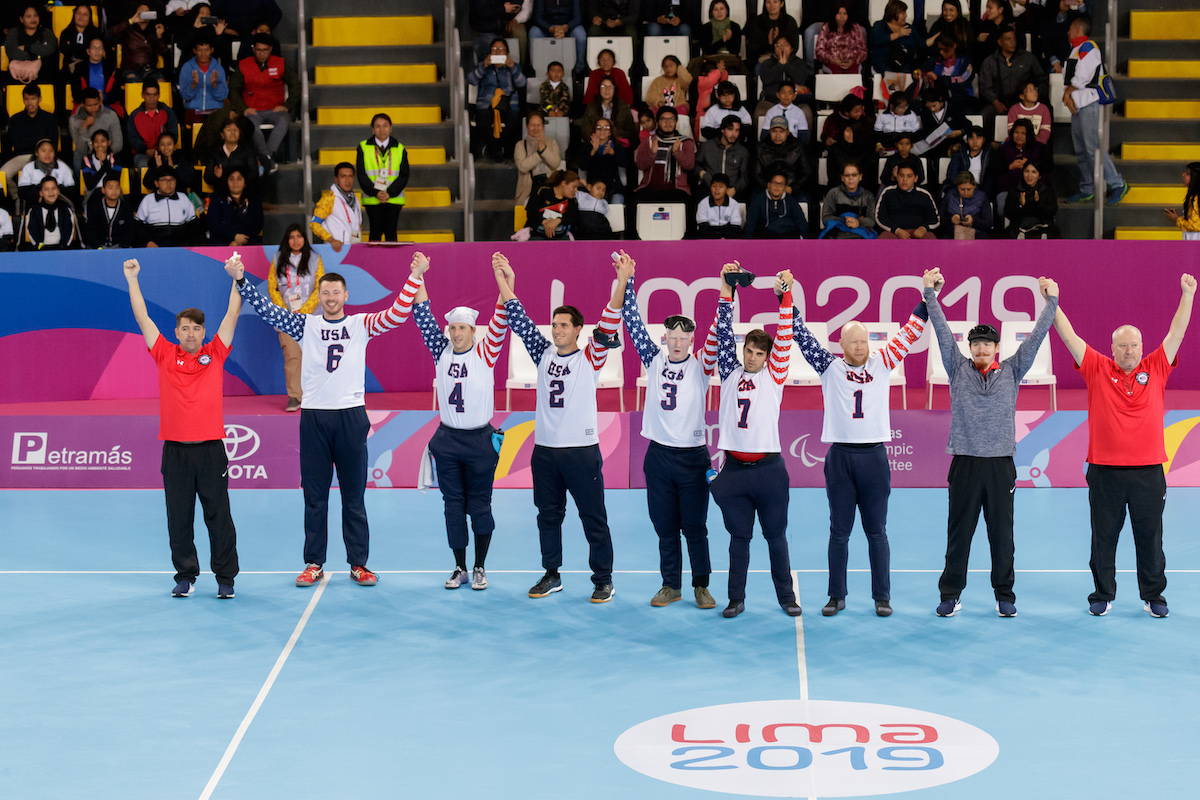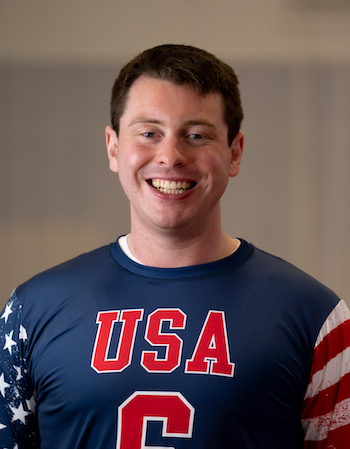
George Mason University alum Calahan Young first became interested in goalball in middle school, while attending a program for kids who were blind and visually impaired.
Young said the program included a demo of goalball, which sparked his interest and led to his participation in youth goalball teams.
Young qualified for the USA Men’s Goalball team and will compete in the Tokyo 2020 Paralympic Games, which begin Aug. 25.
“It was a dream come true to get named onto the team,” said Young, who earned a master’s degree in health administration this spring from Mason’s College of Health and Human Services. “It has been an amazing opportunity.”

Goalball is a team sport for the blind played on a 9- x 18-meter court, the same size as a volleyball court. Using ear-hand coordination, participants compete and try to throw a 3-pound ball that’s been embedded with bells into the opponent’s goal.
“The ball has sleigh bells inside so that the ball can be easily heard, and all athletes wear blacked out goggles to make the playing field equal since blindness is a wide spectrum,” said Young.
The six-member team leaves for Japan on Aug. 17. NBC, Peacock and the NBC Sports App will broadcast coverage of the Paralympic Games, beginning with the opening ceremonies on Aug. 25, and men’s goalball tournament launch on Aug. 26. More than 4,390 athletes are expected to attend the games.
“Calahan has emerged during the postponement of the Tokyo Paralympic Games as an elite goalball player at the international level,” said Keith Young, USA men’s goalball coach. “He exemplifies winning on and off the court with his preparation leading to our most prestigious tournament.”
Young, who also serves as team captain, trains five days a week at the Turnstone Center in Fort Wayne, Indiana, the official U.S. Olympic and Paralympic training site. He and his teammates have trained for the Tokyo Paralympics for almost two years, since fall 2019. They practice for two hours on Mondays, Wednesdays and Fridays and have two-hour weight-lifting sessions on Tuesdays and Thursdays.
Teams roll the ball back and forth to each side, in a consistent volley, at speeds of up to 40 mph, and try to block the ball with their bodies to keep it from going into the 9-meter section of the court. Everyone has to be quiet when the ball is in play.
Young has been playing goalball for 13 years. He was diagnosed with retinitis pigmentosa at a young age and is legally blind.
“My mom and dad have been a part of the process since I found my passion for sports as a kid,” said Young. “Since then I have had many coaches that left their inspirational mark on my life and taught me how to overcome adversity.”
This year will mark Young’s first Paralympics, but he is no stranger to competition.
Young has traveled internationally and competed in the World Championships in Malmo, Sweden, in 2018; the International Blind Sports Federation Paralympic Qualifier Tournament in Fort Wayne, Indiana, in 2019; and the Parapan American Championships in Lima, Peru, in 2019, where the Men’s USA Goalball team won second place and qualified for the Paralympics in Tokyo.
In May, the USA Men’s Goalball team scored first place at a tournament held in Trakai, Lithuania.
“Lithuania is the gold medal team from the 2016 Paralympics in Rio de Janeiro, Brazil,” said Young. “I was the high goal scorer in Lithuania, so it definitely was a motivator before Tokyo.”
The tournament in Lithuania was held just a week after Young graduated from Mason in May. The Pittsburgh, Pennsylvania, native said he hopes to work as a consultant in the health care field after the Paralympics.
“The most memorable part of attending Mason was the opportunity to meet so many different people with vastly different backgrounds from me, both in careers and life,” said Young.
